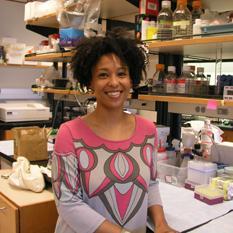
Anjelica Gonzalez’s appointment in Biomedical Engineering in association with the Vascular Biology and Therapeutics Program has provided a supportive and convenient platform for her research, focused on the development of biomaterials for use as investigational tools, particularly for the investigation of immunological responses to inflammatory signals from endogenous and exogenous sources.
Gonzalez has a dedicated interest in training the next generation of scientists to think with an interdisciplinary approach to problem-solving. The Gonzalez lab combines organic chemistry, molecular biology, mathematics, computational modeling, and image analysis to develop and use engineered scaffolds to dissect the chemo-mechanics of immunological processes, specifically those related to microvascular structures. This work has special significance to an array of diseases and disorders, including acute and chronic inflammation and fibrosis.
Research projects in the Gonzalez lab include the development of biomaterials for investigating the influence of outside-in mediated signaling through adhesion molecules, the role of matrix architecture on cell behavior, and multicellular complex signaling in the microvasculature. These phenomena are investigated using human neutrophils, leukocytes, and pericytes. Additionally, in collaboration with Yale School of Medicine Dept. of Dermatology and Pulmonary Medicine, Dr . Gonzalez is elucidating the mechanism of the dermal fibrosis and pulmonary fibrosis. Such work has led to an improved understanding of tissue homeostasis, disease genesis and progression, and the role of new therapeutics in treating human disease.
